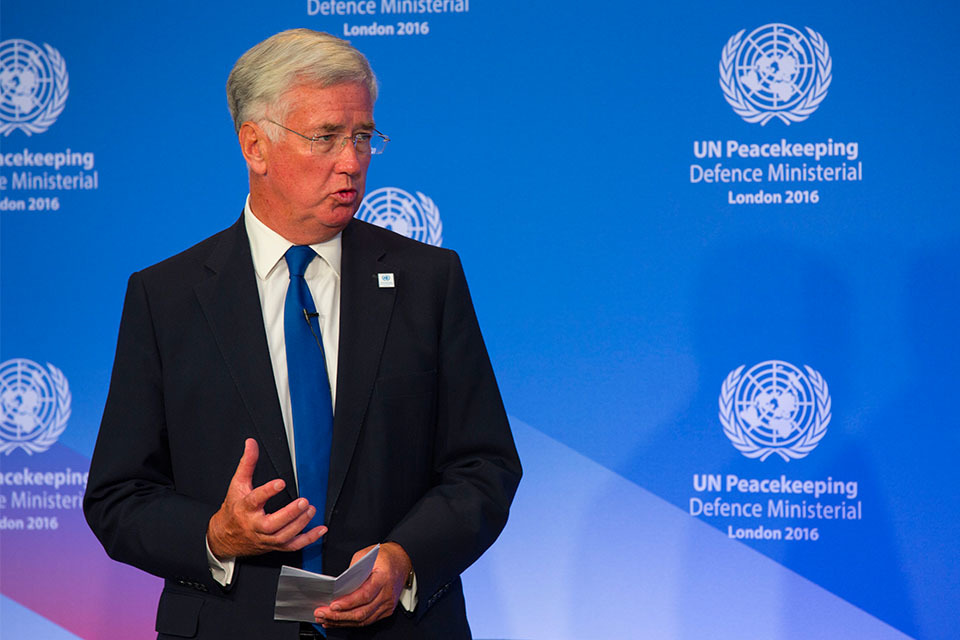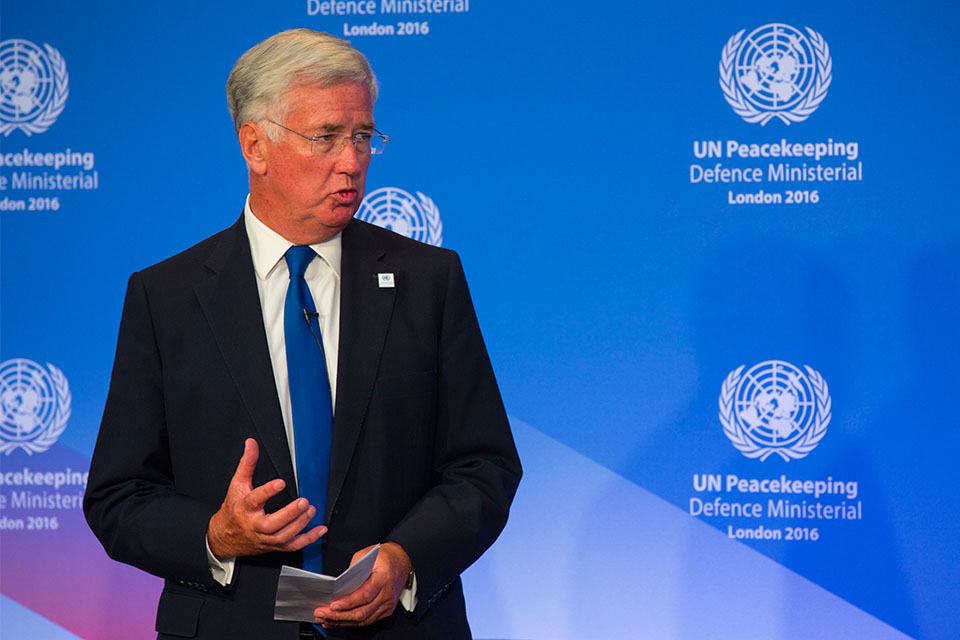Opening Speech at UN Peacekeeping Defence Ministerial: London 2016
It is an honour to welcome you all here this morning. As we are gathered heresome 125,000 peacekeepers are deployed around the worldholding the line between stability and disorder.

I look forward to hearing today from the representatives of nations who have contributed so much to peacekeeping, and also from those who are now stepping up and pledging to do more.
In the UNs history, more than 3000 peacekeepers have lost their livesbut they and all their comrades have ensured a better future for an estimated 125 million people.
So before I continue I would like you to join me in a minute of silent tribute to the service and the sacrifice of our peacekeepers.
At the dinner held last night we spoke of the need for changethe need to do more, and to do it better. Today I want to speak in more detail on how we think that can be done.

Planning
Planning is critical.
We must improve the UNs ability to get the right people and equipment to the right place at the right timewe must improve the effectiveness and efficiency of missions.
This means responding effectively to crisesbetter coordination of national efforts.
Continuing the ongoing work to match resources to mandates.
And being prepared for the unexpected.
Pledges
President ObamaÔÇÖs LeadersÔÇ� Summit last year was a catalystÔǪwith 53 Member States pledging an extra 40,000 troopsÔǪas well as training, equipment, police contingents, and key capabilitiesÔǪsuch as engineers, intelligence units, and helicopters.
This was a remarkable achievementbut the world moves on and so must wewe must ensure that we turn pledges into realityturn an entry on the Peacekeeping Capability Readiness System (PCRS) into a soldier on the grounda helicopter in the airan engineer building a jetty.
The gap between demand and expectation has also underscored the importance of all those pledges made in the lead up to this MinisterialI know well hear more about them this morning.
On behalf of the UK, I am proud to say we too believe in the need for more capability and more capacitywhich is why, when the main body of our force deploys to South Sudan next year, it will bring a Role 2 Medical Facility to UN forces in Bentiufilling a critical capability gapand we will go further, and build a permanent facility there, allowing future force providers the benefit of an established facility.
This is a key capability and such decisions are not taken lightly, particularly in a world where it is much in demandbut it is a clear signal of the UKs commitment to do more to support UN Peacekeeping efforts. 27 other countries have made additional pledges since President Obamas Summit last year.
Performance
Having more people and more and better capability is a great step forwardbut we must also make sure that we achieve the right quality.
This starts with trainingpeacekeepers must be trained, and fit for purposewith the right equipmentand fully vetted before deployment.
Poor performanceÔÇ� the absence of leadership or moral courageÔǪwill not only demoralise our peopleÔǪbut lose the hearts and minds of the public they are there to protect.
There have been some shocking examples of poor performance that we would all deplorewe must all agree that there must be a zero tolerance policy on sexual exploitation and abuse.
The UK and others provide training in key areas required by peacekeepers, on a range of key tasks, including tackling sexual violence in conflictwe need to seek out further opportunities to provide this support.
Performance is also about participation.
There are too few women peacekeepersa gender mix of peacekeepers can have a major impact on operational effectiveness.
Women in the military are a force multiplierwhose participation can really drive success.
The UN needs to pursue opportunities for women peacekeepers to participate, which means Member States stepping up to provide women to these roles. So we must redouble our efforts to enable the participation of women in all aspects of peacekeeping.
The UK has, this year, completed a comprehensive review of women in close ground combatI am proud to say that all roles in the UK Armed Forces will be open to women.
Conclusion
It is important that we work hard today, matching the ambition of our agenda to the ambition that we achieved in our communiqu├®. I am grateful to those that have already signed up to the communiqu├®, and I hope those that havenÔÇÖt yet done so will take the opportunity today.
But now let me conclude, reminding you of the three PsÔǪPlanningÔǪPledgesÔÇ� Performance.
Lets bear these in mind as we talk todaylets celebrate the success of further pledges to peacekeepinglets drive the better planning that we needlets commit to the high standards of performance that we all expect, and that we will all get from our peacekeepers.
Updates to this page
-
added image.
-
First published.